Primitive polynomial is a concept in modern algebra. It is a polynomial with the largest common factor of 1 satisfying all coefficients on the unique decomposition domain. The primitive polynomial is not equal to zero, and the polynomials associated with the primitive polynomial are still primitive polynomials;
1) In MATLAB, primitive polynomials can be generated by the function primely (x).
2) In MATLAB, a minimum primitive polynomial can be found through the function gfprimfd(m,'min').
The next resource of csdn is called "primitive polynomial c language generation";
Run up and have a look. You can generate and test whether it is primitive polynomial and inverse;
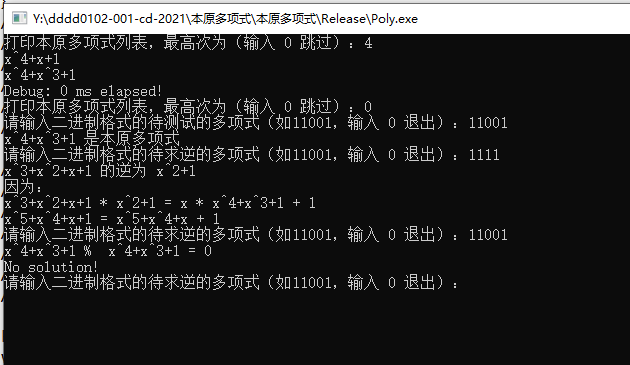
Create a new MFC single document project; Put poly H and poly CPP added to the project; Generate it; The following error appears;

Add "stdafx.h" to the corresponding file, and the error will disappear;
The error shown in the figure below appears again after the reconstruction;

Put "stdafx.h" before other header files,
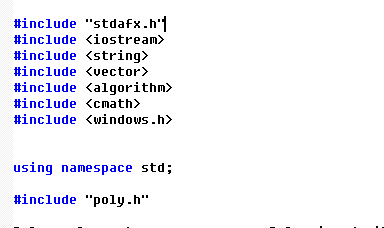
The primitive polynomials listed when entering 7 are as follows,
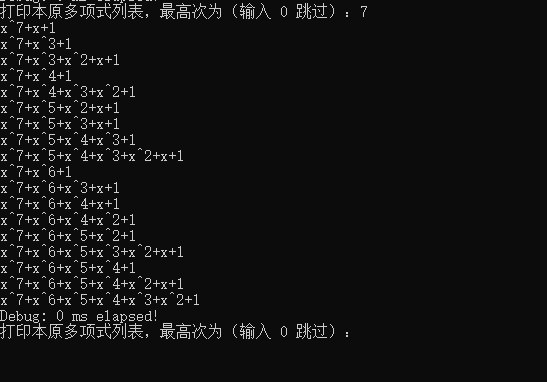
According to its original code, call the listPrimitive function of Poly class to pass a maximum number of terms, that is, output the original polynomial sequence; Next, 7 is passed, and the device description table handle is passed for output;
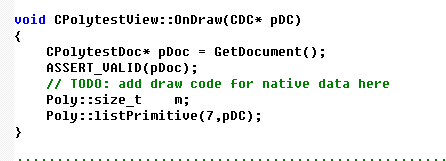
Its original function is as follows; This function has only one output statement of cout < < in C + +;
According to its original meaning, it is simply changed to PDC - > textout() output; The following figure;
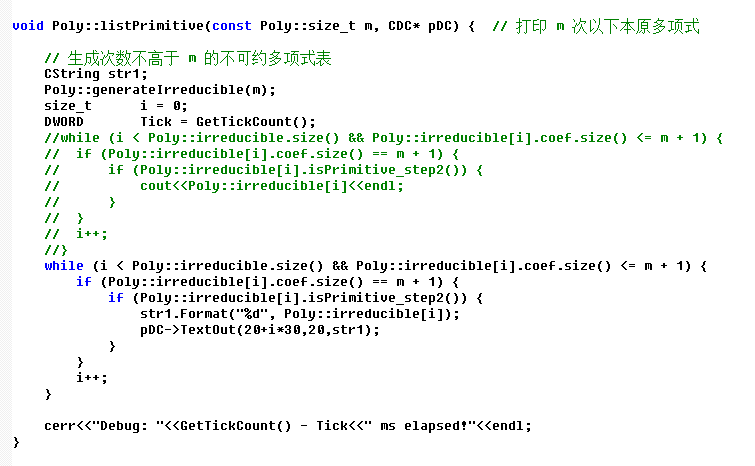
Run it, just output a bunch of numbers; So how do polynomials output? It's x^4+x^3+1. How to output this?

Look at the code; The < < operator of C + + was overloaded; In this overload, the plus sign is output, and 1 or X or x ^ is output according to the situation; Is such an output polynomial;
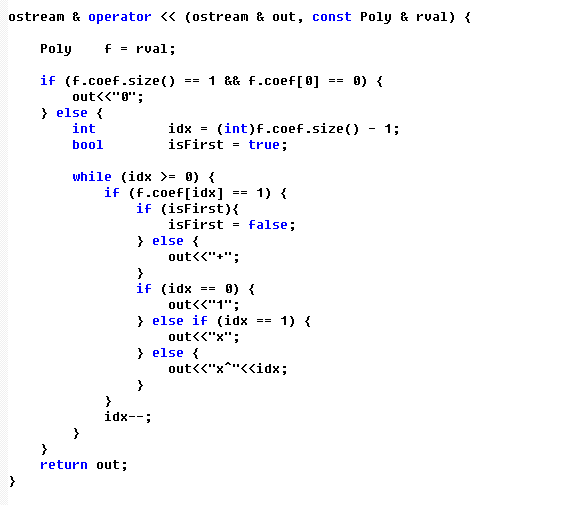
Its original code; The generated polynomial is put into the vector;
void Poly::generateIrreducible(const Poly::size_t m) {
// Generate irreducible polynomial table with degree not higher than m
Poly f;
if (Poly::irreducible.empty()) {
Poly::irreducible.push_back(Poly("10"));
Poly::irreducible.push_back(Poly("11"));
}
// Skip computed irreducible polynomials
f.coef.resize(Poly::irreducible[Poly::irreducible.size() - 1].coef.size(), 0);
f.coef.reserve(m + 1);
f.coef.push_back(1);
while (f.coef.size() <= (m + 1)) {
size_t i;
const size_t size = f.coef.size();
const size_t max_exp = (size - 1) / 2;
const size_t list_size = Poly::irreducible.size();
// In the division test, the divisor is not higher than max_ All irreducible polynomials of exp degree
i = 0;
while (i < list_size && Poly::irreducible[i].coef.size() <= max_exp + 1) {
if ((f % Poly::irreducible[i]).isZero())
break;
i++;
}
if (i == list_size || Poly::irreducible[i].coef.size() > max_exp + 1) {
// All irreducible polynomials are irreducible polynomials
//cerr<<"Debug: irreducible "<<f<<endl;
Poly::irreducible.push_back(f);
}
// Generate the next polynomial to be tested
i = 0;
while (i < size) {
if (f.coef[i] == 0) {
f.coef[i] = 1;
break;
} else {
f.coef[i] = 0;
}
i++;
}
if (i == size) {
f.coef.push_back(1);
}
}
//for (size_t i = 0; i < Poly::irreducible.size(); i++) {
// cerr<<"Debug: irreducible "<<Poly::irreducible[i]<<endl;
//}
}First understand its code; Transform listPrimitive,
void Poly::listPrimitive(const Poly::size_t m, CDC* pDC) { // Print primitive polynomials below m times
// Generate irreducible polynomial table with degree not higher than m
CString str1;
int row;
Poly::generateIrreducible(m);
size_t i = 0;
DWORD Tick = GetTickCount();
//while (i < Poly::irreducible.size() && Poly::irreducible[i].coef.size() <= m + 1) {
// if (Poly::irreducible[i].coef.size() == m + 1) {
// if (Poly::irreducible[i].isPrimitive_step2()) {
// cout<<Poly::irreducible[i]<<endl;
// }
// }
// i++;
//}
row=0;
while (i < Poly::irreducible.size() && Poly::irreducible[i].coef.size() <= m + 1) {
if (Poly::irreducible[i].coef.size() == m + 1) {
if (Poly::irreducible[i].isPrimitive_step2()) {
str1.Format("%d", Poly::irreducible[i]);
pDC->TextOut(20+i*10,20+row*i,str1);
int idx = 6;
while (idx >= 0) {
if (idx == 0) {
pDC->TextOut(20+i*30,20+row*i,"1");
} else if (idx == 1) {
pDC->TextOut(20+i*30,20+row*i,"x");
} else {
pDC->TextOut(20+i*30,20+row*i,"x^");
}
idx--;
}
}
}
i++;
}
//cerr<<"Debug: "<<GetTickCount() - Tick<<" ms elapsed!"<<endl;
}Take a look at the output; Unsuccessful,

Then idx should be the length of a single polynomial generated each time; So much first;
The primitive polynomial is also used in the construction of spread spectrum code sequence of spread spectrum communication; At the same time, this paper is classified into the development category of communication software;